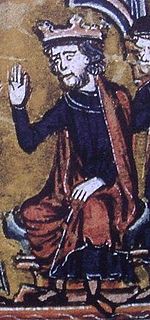
Back بلدوين الثاني Arabic بلدوين التانى ARZ II Baldvin (Qüds kralı) AZ Балдуин II (Йерусалим) Bulgarian Baldoen II Jeruzalem BR Balduí II de Jerusalem Catalan Balduin II. Jeruzalémský Czech Balduin 2. af Jerusalem Danish Balduin II. (Jerusalem) German Βαλδουίνος Β΄ της Ιερουσαλήμ Greek
| Baldwin II | |
|---|---|
 | |
| King of Jerusalem | |
| Reign | 2 April 1118 – 21 August 1131 |
| Coronation | 25 December 1119 |
| Predecessor | Baldwin I |
| Successors | Fulk and Melisende |
| Count of Edessa | |
| Reign | 1100–1118 |
| Predecessor | Baldwin I |
| Successor | Joscelin I |
| Born | c. 1075 Rethel, Kingdom of France |
| Died | 21 August 1131 (aged c. 56) Jerusalem, Kingdom of Jerusalem |
| Burial | Church of the Holy Sepulchre, Jerusalem |
| Spouse | Morphia of Melitene |
| Issue | |
| House | House of Rethel |
| Father | Hugh I, Count of Rethel |
| Mother | Melisende of Montlhéry |
Baldwin II, also known as Baldwin of Bourcq or Bourg (French: Baudouin; c. 1075 – 21 August 1131), was Count of Edessa from 1100 to 1118, and King of Jerusalem from 1118 until his death. He accompanied Godfrey of Bouillon and Baldwin of Boulogne to the Holy Land during the First Crusade. He succeeded Baldwin of Boulogne as the second count of Edessa when he left the county for Jerusalem following his brother's death. He was captured at the Battle of Harran in 1104. He was held first by Sökmen of Mardin, then by Jikirmish of Mosul, and finally by Jawali Saqawa. During his captivity, Tancred, the Crusader ruler of the Principality of Antioch, and Tancred's cousin, Richard of Salerno, governed Edessa as Baldwin's regents.
Baldwin was ransomed by his cousin, Joscelin of Courtenay, lord of Turbessel, in the summer of 1108. Tancred attempted to retain Edessa, but Bernard of Valence, the Latin patriarch of Antioch, persuaded him to restore the county to Baldwin. Baldwin allied with Jawali, but Tancred and his ally, Radwan of Aleppo, defeated them at Turbessel. Baldwin and Tancred were reconciled at an assembly of the crusader leaders near Tripoli in April 1109. Mawdud, the Atabeg of Mosul, and his successor, Aqsunqur al-Bursuqi, launched a series of campaigns against Edessa in the early 1110s, devastating the eastern regions of the country. Baldwin accused Joscelin of treason for seizing the prosperous town of Turbessel from him in 1113 and captured the neighboring Armenian lordships in 1116 and 1117.
Baldwin of Boulogne, the first king of Jerusalem, died on 2 April 1118. He bequeathed Jerusalem to his brother Count Eustace III of Boulogne, stipulating that the throne was to be offered to Baldwin if Eustace failed to come to the Holy Land. Arnulf of Chocques, the Latin patriarch of Jerusalem, and Joscelin of Courtenay, who held the largest fief in the Kingdom of Jerusalem, convinced their peers to elect Baldwin king. Baldwin took possession of most towns in the kingdom and gave Edessa to Joscelin. After the army of the Principality of Antioch was almost annihilated on 28 June 1119, Baldwin was elected regent for the absent Prince Bohemond II of Antioch. The frequent Seljuq invasions of Antioch forced him to spend most of his time in the principality, which caused discontent in Jerusalem. After Belek captured him in April 1123, a group of noblemen offered the throne to Count Charles I of Flanders, but Charles refused. During his absence, the Jerusalemite troops captured Tyre with the assistance of a Venetian fleet. After he was released in August 1124, he tried to capture Aleppo, but al-Bursuqi forced him to abandon the siege in early 1125.
Bohemond II came to Syria in October 1126. Baldwin gave his second daughter, Alice, in marriage to him and also renounced the regency. Baldwin planned to conquer Damascus, but he needed external support to achieve his goal. He married off his eldest daughter, Melisende, to the wealthy Count Fulk V of Anjou in 1129. The new troops who accompanied Fulk to Jerusalem enabled Baldwin to invade Damascene territory, but he could seize only Banias with the support of the Nizari (or Assassins) in late 1129. After Bohemond II was killed in a battle in early 1130, Baldwin forced Alice to leave Antioch and assumed the regency for her daughter, Constance. He fell seriously ill in Antioch and took monastic vows before he died in the Holy Sepulchre. Baldwin had been respected for his military talent, but he was notorious for his "love for money".